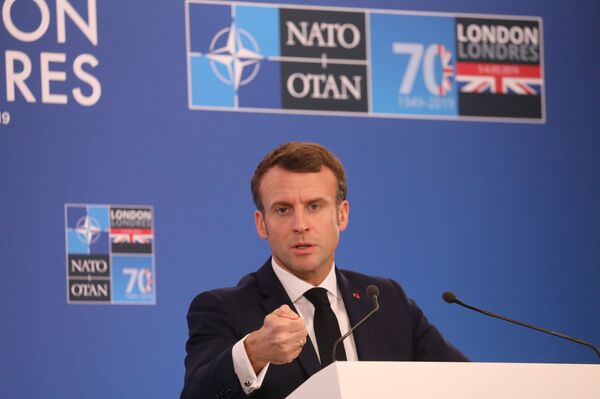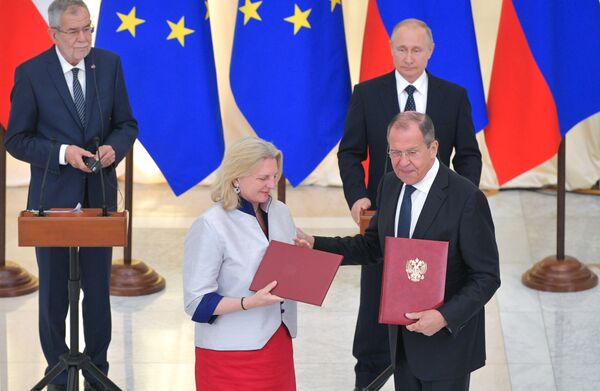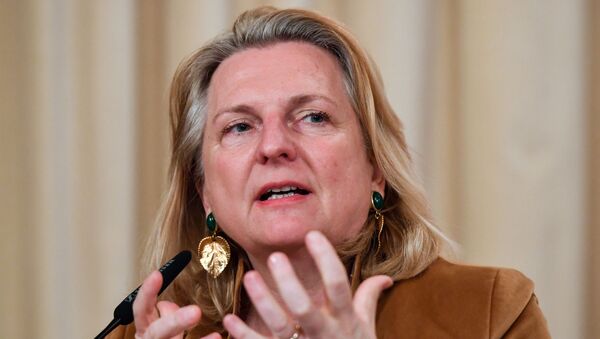During her visit to Moscow, Kneissl spoke about party politics in Austria, the country’s "shift to the right" and her starting from "scratch."
Sputnik: Mrs Kneissl, you could have spent this advent in peace and quiet at home, but you came to Moscow. What are your plans?
Karin Kneissl: I received an invitation to the Sochi Dialogue (the Russian-Austrian public forum, founded in March 2019 by Karin Kneissl and Russian Foreign Minister Sergei Lavrov). I will present the Russia edition of my children's book “Prince Eugene” and will deliver a lecture at MGIMO (Moscow State University of International Relations) on the topic of geopolitics using examples from China, Russia and Europe. Then at the [Moscow State] Linguistic University, I will talk about my book “Prince Eugene,” and at the Diplomatic Academy, I will share my thoughts on the lack of dialogue. As a minister, I was horrified to discover the extent to which real diplomacy was “squeezed out” of the political scene by pre-written scripts in the form of discussion notes for all kinds of meetings.
Sputnik: At the end of November, at the European Media Summit in Lech, you spoke about the “split world”. What divides the world these days?
Karin Kneissl: Back in 2012, I wrote in the book - “The Shattered World – What Remains of Globalisation” - that it will come down to Brexit. It is, in particular, about the disintegration of states that I observed in Lebanon and Bosnia. Between “Lebanonization” and “Balkanization”, the Soviet Union and other states, primarily Yugoslavia, collapsed. Today, new states may arise, and not only in the Caucasus or the Balkans, in this regard, the problems in Scotland, Catalonia and many other regions are also relevant.
Sputnik: In eastern Ukraine too?
Karin Kneissl: I don’t know. But I always say that the problem of the disintegration of states has occurred throughout history. When I was in school, officially there were 156 countries, today there are 193 UN member states, and before the First World War there were only about 30-40 states in the world with just over a dozen in Europe.
Sputnik: What leads to the collapse: is it primarily the politicians or the population?
Karin Kneissl: Nobody would have even imagined in 1989 that Yugoslavia would break up. It was a country that in economic and socio-political terms was more stable than Poland or Hungary. At the same time, at the very beginning of the war in Yugoslavia, it was not the outside interference that led to certain social movements.
Austrian scientist Leopold Kohr, the author of ‘The Breakdown of Nations’ and the founder of the ‘Small is beautiful’ school, wrote that within Europe things may go back to as they once were and we may see a return to former regions. A lot has been said about the “Europe of the Regions” in the EU back in the 1980s, including in Austria, Bavaria and South Tyrol. In fact, we are witnessing regionalization in many areas, but in the end, it is not an answer to all the questions.
“The Austrian People's Party Can No Longer Be Called Centrist”
Sputnik: How is the situation in Austria developing now?
Karin Kneissl: Austria, being the medium-sized state in Europe, undoubtedly experienced great changes. I ask myself: how did a generation of my grandfathers and great-grandfathers manage to regain confidence in their country. This was a huge problem in the 1920-1930s, but it plays no role in the Austrian socio-political debate today. What drives us more is: what is next? What will be the ratio between large, medium and small countries? Take France for example. It calls itself the “Grande Nation” - a great nation, and I greatly respect this position. But the reality that we are all small sometimes gets lost, whether in political debate or in our own perceptions. In Austria, strangely enough, a rather arrogant view of countries like Poland often prevails, although Poland is a big and very important state.
Sputnik: And what about the “shift to the right”?
Karin Kneissl: Since 1945, we have seen a serious redistribution of power between the Social Democrats and Christian Democrats. Everyone wanted it - no one needed the repetition of the bloody civil war of 1934 between the clerical-conservative and social-democratic, plus all the left forces, which came to an end with the establishment of the authoritarian system under Engelbert Dollfuss. The concordance democracy that followed was conceptually correct, but after 40 years there was no more competition. The Austrian People's Party (ÖVP) and the Social Democrats (SPÖ) shared leadership positions, and it is only logical that the Freedom Party (FPÖ) also wanted to get involved too. Even after numerous scandals, the real power in the country was in the hands of the ÖVP and SPÖ. This “glass ceiling” was only broken in the 90s by Jörg Haider - the former leader of the Freedom Party. He had a brilliant mix of intelligence, charisma and even populism - but which politician is not a populist? By no means do I want to praise Haider, but he understood how he could win the election combining provocative behaviour and criticism, taking advantage of the “division” of the country. As a result, Haider could not cope with himself, leaving behind a legacy of bankruptcy and litigation.
Sputnik: A colleague from Austria tells me that when she takes her Russian husband to Graz, she often hears xenophobic remarks as if he were a third-class person. This is not the real Austria, is it?
Karin Kneissl: It is difficult to say what the political mood is in society, because, according to recent polls, the Freedom Party is supported by no more than 16% of the citizens. But the People’s Party today is much “more right” than a couple of years ago. Sebastian Kurz borrowed quite a lot of ideas from the Freedom Party, primarily regarding the integration problem. So the ÖVP can no longer be called centrist. As far as the story of your colleague is concerned, in our society - as in German - there are, unfortunately, plenty of silly stereotypes, despite people travelling a lot. I do not know when this situation will finally change. Travel and education are often not enough.

“This is Due to Non-Participation in NATO”
Sputnik: The Greens can now make it into the government. They are also considered less pragmatic when it comes to relations with Russia. Should Moscow fear that Austria's policy on Russia will become less pragmatic?
Karin Kneissl: There is no government yet. It seems to me that Chancellor Sebastian Kurz has a very pragmatic policy when it comes to interests. I don’t think that things will change much. The question is whether a government with the participation of the Greens will be created at all, which is now circulated in the media. We have to wait and see what the government program will be, in particular, when it comes to foreign policy.
Sputnik: What “interests” do you mean? These should be, perhaps, first and foremost, business interests uniting Russia and Austria. Perhaps another couple of cultural initiatives. Politically, countries don't have much in common, do they?
Karin Kneissl: In Europe, Emmanuel Macron is currently the most active. Recently, in an interview with The Economist magazine, he bluntly said that the problem is not Russia. We just saw during the NATO summit in London that alliance members look at things very differently. China is now the main challenge. We, Russia and Austria, in turn, are geographically and historically connected. Our famous and experienced journalist Hugo Portisch, incidentally, recently quoted Helmut Schmidt [former German chancellor] during a conversation with me at the Military Academy in Vienna, who said that you can’t imagine Europe without Russia. I have a favourite quote of my own from Otto Bismarck, who said that geography is a constant of history. Portugal, for example, is very “transatlantic” because this former colonial power had to deal with completely different historical problems.

Sputnik: Is Russia important for Austria in geopolitical terms? Just as Macron sometimes turns to Moscow as a partner to balance between Washington and Berlin.
Karin Kneissl: As a minister, I always said that we need a dialogue in both directions, and the Sochi dialogue is only one of my three priorities. But in the perception of our population, we are certainly not as “transatlantic” as, for example, Denmark or the Netherlands. This is due, in particular, to our neutral status and non-participation in NATO. As for the United States, our economic, cultural and diplomatic ties with them have been and remain very close, but at the same time, they are not linked by a military alliance.
“In our envious society, there’s too little respect for the achievements of others”
Sputnik: “Maintain your dignity and keep going” - that’s what you wrote, and it seems to apply to Eugene of Savoy - the character of your book. What do you admire about him?
Karin Kneissl: Who in our time can be an example for children? There are no more role models left in our schools. Prince Eugene stood out for his determination, discipline, certain virtues and decisiveness. Towards the end of his life, perhaps, the most famous commander in the world, but he was at first a child that nobody wanted or loved. At the age of 19, he came to Vienna and worked his way up. He had to lead soldiers into battle, but he was also interested in his art collection and correspondence with Gottfried Leibniz. And he was a big animal lover. Animals under him were kept in appropriate conditions - they were not an “attribute” of social status for him as for the rest. For some, animals are like family; For children, they can be especially important because they perceive every person the way they are. I was fascinated most by the story of his lion. Prince Eugene took the lion with him to certain meetings to make sure that certain people would not show up. And the lion died on the same night as he did. When Napoleon occupied Vienna in 1809, he wanted to see a vulture in the zoo in Schönbrunn, which was said to have been stroked and fed by Prince Eugene himself. That's how great the respect was for him.
Sputnik: Is his story in some way personal to you?
Karin Kneissl: Fortunately, I am not a general. I am glad that I didn’t have to take responsibility for the armed forces as a minister, that my decisions were banal compared to those politicians who have to decide whether or not to send troops to Syria. I find myself in Prince Eugene because in my life I also had hard times. You work on yourself, achieve some success, and then the people around you begin to envy you. Prince Eugene was accused of betrayal and almost executed. Envious people said that he had his sights set on the emperor’s crown. When he accidentally found this out from a valet, he demanded to convene a special committee of inquiry. I hope that this will never happen to me, what happened to Prince Eugene, and if it does, then I will know about it in a timely manner. He, like Klemens von Metternich, had to live, surrounded by envy. In our envious society, people show little respect for the real achievements of others.
Sputnik: That is, is it still present in Austria?
Karin Kneissl: I have Armenian-Lebanese and Iranian friends who stayed by my side during the most difficult times. They could live anywhere but remain in Lebanon or Iran. They strive to help make their countries better. If society changes, then it only comes from the people, because the transformation from the outside is not real. They want their countries to take a different path, so a society where achievements count, not contacts, is formed. That's one aspect where I have repeatedly failed in Austria: here achievements do not have the importance that they should have. I'm now starting in Austria from scratch. I am grateful that I grew up in Austria, that I had the opportunity to study here and always with pleasure served my country, in particular, as a minister. But sometimes I have problems with the Austrian envious society and its other flaws.

